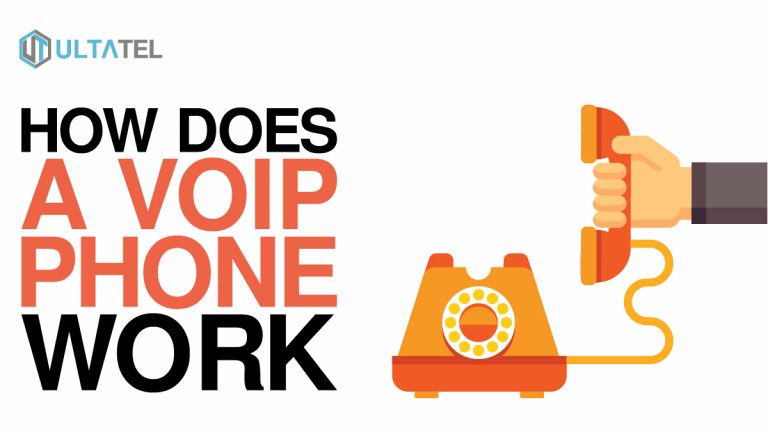While launched in 1995, VoIP systems are only now making a much-deserved comeback as businesses attempt to keep up with AI technology. If you’re looking to hop on the bandwagon for this in-demand phone system, you may be wondering: how do VoIP phones work?
Learn how VoIP systems function, what components make up their unique architecture, and what features you can enjoy.
How Does VoIP Work?
VoIP works by converting analog voice signals into digital data packets, which are then transmitted over IP-based networks like the internet. These data packets travel across the network, reaching their destination where they are reassembled back into voice signals for the recipient.
VoIP utilizes various protocols and codecs to facilitate efficient transmission, including SIP (Session Initiation Protocol) for call signaling and RTP (Real-Time Transport Protocol) for carrying the actual voice data.
VoIP Components and Architecture
A VoIP phone system comprises several components that enable voice communication over the Internet. These components include:
- VoIP phones or softphones: VoIP phones are specialized devices resembling traditional telephones that use VoIP systems. They convert voice signals into digital packets that can transmit over the internet. On the other hand, softphones are software applications that allow users to make VoIP calls using their computers, tablets, or smartphones.
- VoIP gateway: A VoIP gateway bridges traditional phone networks (PSTN) and VoIP networks. It converts analog voice signals from traditional phones into digital packets that travel over IP networks.
- IP network: The IP network refers to the infrastructure that allows data packets, including voice packets, to be transmitted over the Internet. This network can be a private network within an organization or a public network.
- VoIP server: The VoIP server is responsible for call management, call routing, and other essential functionalities of the VoIP system. It handles tasks such as call setup, call termination, and call forwarding.
VoIP Phone System Requirements
You must meet specific requirements to set up a VoIP phone system. These include:
- Reliable Internet connection: Since VoIP relies on Internet connectivity, a stable and high-speed Internet connection is crucial for quality voice transmission. Providers typically recommend at least 100kbps of upload and download speed to make VoIP calls.
- VoIP service provider: A VoIP service provider offers the necessary infrastructure and services to make and receive VoIP calls. Choose a reputable supplier like ULTATEL for tailored solutions.
- VoIP phones or softphones: You can obtain physical VoIP devices or softphones to take calls depending on your preference and requirements.
How Does VoIP Work With Different Devices?
VoIP technology is versatile and can work with various devices, providing flexibility and convenience for users.
Analog Telephone Adapters (ATA)
VoIP works with analog telephone adapters (ATAs) by bridging the gap between traditional analog telephones and IP-based networks. An ATA is a device that converts analog signals from a standard telephone into digital data packets suitable for transmission over the internet. When a call is made using an analog telephone connected to an ATA, the analog voice signals are converted into digital format by the ATA. These digital packets are then transmitted over an IP network, such as the internet, to the VoIP service provider’s servers. The servers route the packets to the intended recipient’s device or telephone network, where they are converted back into analog signals for the recipient to hear. The ATA essentially acts as a mediator, allowing analog devices to connect to and utilize the benefits of VoIP technology.
VoIP Handsets
VoIP handsets are specialized devices designed to work with Voice over Internet Protocol (VoIP) technology. These handsets have built-in hardware and software components that enable direct communication over IP networks. When a user initiates a voice call on a VoIP handset, the audio is captured by the handset’s microphone and converted into digital data packets. These packets are then transmitted over the internet, either through a wired Ethernet connection or a wireless network like Wi-Fi. The VoIP service provider’s servers receive the packets and route them to the intended recipient’s device or telephone network. The recipient’s VoIP handset receives the packets, decodes them into audio signals, and plays them through its speaker, allowing the user to hear the call. VoIP handsets typically use protocols like SIP for call signaling and RTP for transmitting voice data, ensuring seamless communication and integration with VoIP systems.
Mobile Devices
VoIP on mobile devices functions by utilizing specialized applications that leverage the internet connectivity of the device. When a user initiates a voice call, the audio is captured by the device’s microphone, converted into digital data packets, and transmitted over the internet via Wi-Fi or cellular data. These packets are sent to the VoIP service provider’s servers, where they are routed to the recipient’s device. The recipient’s device receives the packets, uses the VoIP application to decode them into audio signals, and plays them through the device’s speaker, enabling the user to hear the call. Mobile VoIP applications employ protocols like SIP for call signaling, RTP for voice data transmission, and SRTP for encryption and security, enabling cost-effective communication and additional features such as video calls and messaging.
Personal Computers and Laptops
VoIP on personal computers and laptops operates through the use of software applications or clients that enable voice communication over IP networks. When a user initiates a voice call using a VoIP application on their computer or laptop, the audio input is captured by the device’s microphone and converted into digital data packets. These packets are then transmitted over the internet, either through a wired Ethernet connection or a wireless network like Wi-Fi. The VoIP service provider’s servers receive the packets and route them to the intended recipient’s device. The recipient’s computer or laptop receives the packets and uses the VoIP application to decode them into audio signals, which are then played through the device’s speakers or headphones, allowing the user to hear the call. VoIP software on personal computers and laptops utilizes protocols like SIP for call signaling and RTP for voice data transmission, enabling seamless communication and integration with various VoIP services and features.
Top VoIP Features and Functionality
VoIP offers a wide range of features and functionalities that enhance communication capabilities. Some of the top VoIP features include:
- Call routing and forwarding: VoIP allows users to route calls to specific destinations based on predefined rules. Calls can be forwarded to multiple devices simultaneously, ensuring you get all of them.
- Call recording: VoIP systems often provide the ability to record calls for monitoring, training, and compliance purposes. Recorded calls can be stored locally or in the cloud.
- Voicemail: VoIP systems typically include voicemail functionality, enabling callers to leave messages when the recipient is unavailable. Users can access voicemail remotely through the VoIP system or email.
- Text messaging: Send quick and important reminders via text message, as you would with a traditional smartphone.
- Conference calling: VoIP makes setting up conference calls with multiple participants easy. Participants can join the discussion via a conference bridge through their VoIP phones, softphones, or even traditional phones.
- CRM integrations: If your team needs a boost of productivity, you can streamline communications by integrating VoIP systems into your CRM.
Summary
Because VoIP systems are Internet-based, they provide impressive communication flexibility to access in-office and on the road. With the essential components and a general understanding of how it functions, VoIP can be your secret weapon to increase customer satisfaction and make a name for your business.
If you’re looking for a reliable and affordable service provider for your VoIP system, ULTATEL has what you need.

